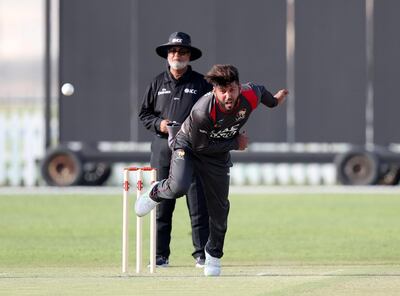Shaiman Anwar plans to appeal against his eight-year ban from cricket, claiming “everything which is happening is wrong”.
The former UAE batsman, as well as the ex-captain Mohammed Naveed, were found guilty in January of two charges of corruption.
After two months of consideration, the independent tribunal this week ruled the two players will be ineligible to return to playing until October 2027. By that time, Shaiman will be 48, with his career essentially over, and Naveed 40.
The duo had been thrown out of the game in October 2019 after being charged with two counts of breaching the sport’s anti-corruption code.
The guilty verdict followed an investigation by the ICC’s anti-corruption unit which produced a report exceeding 400 pages, as well as a two-day disciplinary hearing in November 2020.
The tribunal ruled the players had been planning to fix aspects of matches against Ireland and Oman at the 2019 T20 World Cup Qualifier, and discussed sums ranging up to $270,000 for the work.
Shaiman maintained a public silence throughout the case, except for one brief tweet protesting his innocence.
Now he says he wants to clear his name as he does not want his playing career to end.
"Everything which is happening is wrong, and an eight-year ban is unfair," Shaiman told The National.
“They must give us punishment according to our mistake. It is common sense that, if a Test nation player, as they said, [is] offered 30,000 [dollars] how any person can offer an Associate player such a big amount?
“I totally deny the other allegations.”
Both Shaiman and Naveed acknowledge their failure to report a corrupt approach. That was the lesser of the two charges that faced them, and carried with it a potential sanction of between six months and five years.
However, both deny they conspired to fix aspects of matches, the charge which carried with it the potential for a lifetime ban.
In the report determining their guilt, it was stated that Shaiman had arranged a meeting with Deepak Agarwal to discuss the potential for fixes.
Agarwal is the Indian businessman who was subsequently suspended from the sport for two years for “obstructing and delaying” ICC investigations. He was also named in the case that saw Bangladesh’s Shakib Al Hasan banned in October 2019.

In this week’s sanction report, it was stated that “the approach to Mr Agarwal was clearly pre-meditated, at least by Mr Anwar, given that Mr Anwar asked [a friend of his] to arrange a meeting between him and Mr Agarwal”.
Shaiman was said to have given Agarwal three separate telephone numbers to contact him on, including one he said belonged to his barber.
“Both Mr Anwar and Mr Naveed sought to corrupt others, namely Mr Agarwal [irrespective of whether either Mr Anwar or Mr Naveed were aware of Mr Agarwal’s prior involvement in corrupt activity],” the sanction report stated.
In a plea for clemency ahead of the sanctions being set, Shaiman pointed out he had provided “full assistance” to the ACU.
However, the tribunal reflected that “far from cooperating” he “persistently misled” the investigation.
“After careful scrutiny of this material in the tribunal’s view the claim stretches the concept of remorse in its ordinary meaning beyond breaking point,” the sanction report stated.
“In the email of 28 October 2019 Mr Anwar accepts that he had a duty to inform the ACU but goes on to say that he ‘could not do it keeping in mind the nobility and fair dealing of [his friend who brokered the meeting with Agarwal].
“This is rationalisation, not remorse. There is no expression of regret, let alone utmost regret.”
Shaiman, though, claims the issues are “confused”.
“I will appeal because I don't want my career [to finish] as I can play more,” Shaiman said.
“Most people who did wrong, who were caught red handed, got a five-year ban, and those who didn't do wrong things are getting eight years.
“I am 42 now. An eight-year ban means end of career. They must punish us, but not for those things which have not happened.
“According to the facts they all are confused. How can anyone waste their money on Associate players, like [Dh]1.6m? A player with a Dh6,000 salary getting offer of big dollars money for doing nothing, as they said.”


